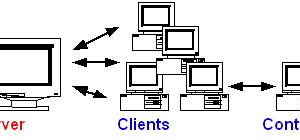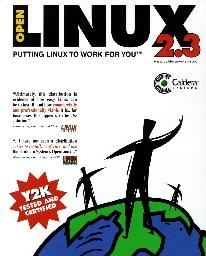Is Free SCO OpenServer free in response to Linux? Perhaps, in part, but the two operating systems aren’t really in competition with each other.
The SCO package looks surprisingly like a typical Linux distribution.
One CD-ROM, two boot floppies, and a leaflet tucked inside a compact package. Primary support is on the Internet, using the Web, newsgroups, FTP and specialized mailing lists (even Compuserve)—Lots of support for PC peripherals. The media costs $19 (U.S. and Canada) plus shipping, but once you have it, you can pass it around to everyone in turn and they can load it for free.
It isn’t until you spot that familiar blue tree logo that you know this Isn’t really your typical Linux distribution; it’s from the Santa Cruz Operation (SCO), the company that’s shipped more official Unix servers than anyone in the world.
What you have in your hands is one of the free copies of SCO OpenServer, which SCO has been dishing out by the scores since its introduction at the SCO Forum conference in mid-August 1996. This software is neither crippled nor time-bombed, and it includes a full software development kit. Everyone who installs the free version must register with SCO, but such registration is free of charge, and is done on a web page. SCO says they’re issuing free registrations at the rate of about a thousand per week, more than two-thirds of them going to people describing themselves as “technical home users”.
On a different web page heralding free OpenServer to the world (http://www.sco.com/Products/freeopen.html), SCO boasts, this “bold move has far-reaching implications for the future of Unix systems, and marks the stunning public debut of SCO’s stewardship of the Unix system.”
Lesser words have made the blood of many a Linux advocate boil, but the “stewardship” is no joke. Since obtaining UnixWare and Unix source code from Novell last year, SCO owns the AT&T pedigree Unix. Like it or not, SCO is now one of the central players who will determine the success of commercial Unix in the years to come.
Who are the other players? Sun certainly, Hewlett-Packard on sunny days, IBM SGI and DEC during full moons, and, of course, everyone in the Linux community. Given the sheer number and enthusiasm of Linux users, Linux will undoubtedly shape the future of the Unix market, even without the positive effect of Lasermoon’s work at Unix certification.
Indeed, the evolution of Linux has already had a major effect on the commercial Unix marketplace. Commercial implementors, like Caldera, have done an excellent job—in a relatively short period of time—of bringing Linux to the attention of the IS community. But they certainly aren’t at SCO’s level yet—nowhere near.
While the introduction of the free SCO can be traced in small part to the rise of Linux, there are other factors about this release which are more important to SCO. Squeezed by Microsoft on one side and Sun and additional RISC vendors on the other, SCO must be seen as an active player—releasing a free version of its bread-and-butter can certainly be seen as “active”.
Is free OpenServer an SCO assault on Linux? Only a little, since, for one thing, there are strings attached to the software that SCO sells at many times the cost of the most expensive Linux distribution. The main restrictions are a two-user-only license (not upgradable to more users) and a prohibition on commercial use.
In other words, you can set up a web server with the free OpenServer, but you can’t sell space on it. You can write and compile all the software you want, as long as you don’t try to sell the result. You can run it at home all you want (as long as you don’t have a home-based business), but if you want to use it legally at work you’ll have to buy the full-priced version.
SCO’s goals with free OpenServer (soon to be followed, we are told, by a similarly free version of UnixWare) can be summed up in three words: exposure, excitement and respect.
The exposure part is easiest to explain. SCO wants as many people as possible to get their hands on OpenServer, to get a taste of it, to evaluate it, to learn it and to develop with it. They want SCO Unix in colleges and universities, so the graduates of today will remember SCO when they make the purchasing decisions of tomorrow. They want people installing OpenServer on their home systems, to increase the level of SCO knowledge in the computer-using populace.
In addition, SCO hopes analysts and other evaluators will take advantage of the free OpenServer, to use it and, it is hoped, dispell some of the many rumours floating around about it. From reading some posts on the Internet, one might surmise the OpenServer of 1996 is merely a dressed-up version of Xenix on steroids.
Now, don’t get me wrong. I’m not personally that fond of OpenServer; when my company sells SCO products, it’s UnixWare we ship out the door, but SCO’s flagship line (that has out-sold UnixWare by a wide margin) doesn’t deserve much of the abuse I’ve seen heaped on it. The free offer is mainly designed to let people see the product and separate fact from fiction.
One of the biggest misconceptions SCO needs to overcome is that OpenServer is a difficult porting target for freeware. While earlier versions of SCO Unix were notorious for their built-by-Microsoft compiler that was a porting nightmare, newer releases have dumped that environment for a considerably more developer-friendly SDK. It’s a constant thorn in the side of SCO that so much freeware takes so long to get ported to SCO, and much of it is not ported at all.
All these new copies of OpenServer in the hands of the people, and all these development systems begging for freeware to be ported to them are what SCO hopes will build some excitement around its product.
After all, SCO has historically been a company with good, but boring products. SCO’s skill is in blending different (and often hostile) technologies together. However, SCO doesn’t produce major inventions like Sun does, doesn’t move forward at the frantic pace of Linux, and doesn’t do hardware like HP and other Unix vendors.
Attention from the press or public is hard to come by for a product that sells well, but contains very little whiz-bang. And as a result SCO doesn’t get respect from independent software vendors. While advances in PC hardware, such as SMP and PCI and the Pentium Pro, allow SCO-based systems to scale well into the turf of the RISC vendors, there are still many enterprise ISVs who ignore SCO despite its huge market share. High-profile developers, like Computer Associates, continue to treat SCO as an also-ran despite the fact that its installed base of Unix servers is larger than anyone else’s.
To a certain extent, this can be seen as a lack of respect, a feeling (justified in my opinion) that SCO is the Rodney Dangerfield of the computer industry. By spreading free copies of SCO around the Unix community, SCO hopes to gain from the analysis by the independent software vendor communities the respect it already has from its users.
Will free availability of SCO’s operating system give it the whiz-bang it craves? Hard to tell. Will any new-found respect come at the expense of Linux? Not likely.
It’s doubtful most current users of Linux are going to reformat their hard disks to install free OpenServer. No one who runs an ISP, uses his Linux system for writing commercial software or needs more than two users can use it legally for those purposes. And the many people who use Unix at work and also run a version at home for learning purposes are satisfied with Linux performance on minimal hardware.
The free OpenServer (or any OpenServer, for that matter) doesn’t come with source code; this limits its value in educational and hobbyist settings, since you can’t really tinker with it. And, while the SCO-supported SkunkWare CD is chock-full of freeware compiled for use with OpenServer, SCO still lags far behind Linux when it comes to freeware availability.
Still, the other side has its advantages. SCO still supports far more commercial applications than Linux, though the number of instances where such apps can be run on free OpenServer (legally) will be quite few. Since SCO is installed on so many corporate Unix servers, the free OpenServer will attract those who perceive SCO familiarity as more marketable than Linux in the IS world. Until Linux makes significant inroads into corporate servers and is supported by major database ISVs, this perception will remain a powerful incentive for people to install the free SCO rather than Linux.
So while the free SCO probably won’t do much to shrink the existing installed base, it is reasonable to ask what effect it will have on future growth of Linux. Will anyone actually use free OpenServer to set up a personal web site, endure all the cost and trouble of a full-time link and the necessary administration, while being restricted from taking money to put up pages for others? Some of the biggest growth areas for Linux, such as providing corporate Internet (and Intranet) servers, are not threatened by the non-commercial license of free SCO.
There are still some things SCO does better than Linux; official support for major DBMS systems and very high-end hardware are but two. People needing features like these are not considering Linux anyway, so little will be lost if or when these people install Free SCO.
Are there those amongst the body of Linux users who are only using it until “something better” comes along, or haven’t installed any Unix at home because they didn’t want Linux, but would use SCO within its legal parameters? Some at SCO seem to think so.
To me, these numbers are insignificant. The Internet is filled with stories of people who began with Linux because it was all that was available at the cost, then happily realized it performed beyond expectations. While there are few hard facts, there is much anecdotal evidence that Linux will run faster than SCO on a given hardware platform. Certainly Linux will run on older and cheaper hardware better than SCO will. While good new hardware is inexpensive, people getting their OS for free for home use probably won’t want to spend much on hardware upgrades.
Still, the biggest distinction to be made between the two products has to do with their ultimate purposes. SCO intends its free Unix to boost sales of that which is not free; regular retail for OpenServer ranges from $1,295 to more than $13,000. SCO is even hoping the free two-user OpenServer will encourage people to pay $795 to use the same product legally for commercial use (the SDK is another $395).
Make no mistake about it—the primary targets of free SCO are Solaris and NT, not Linux and other freeware operating systems. In those goals, it is in the interest of all in the community who support Unix on Intel systems (which includes Linux supporters) to encourage SCO’s efforts. It is unreasonable to consider these efforts as competition—Microsoft poses a far greater challenge to Linux and SCO collectively than either pose to each other.
This is borne out by my own experiences. Authorized to sell both Caldera and SCO products, my company has not yet come across a situation where both Linux and SCO would be a good fit—either one or the other is best for any particular job. Except for SCO’s attempt at an Internet server (which is not available under the free license), there’s far less overlap than you may think.
For some, mostly those who already use SCO at work (or hope to), it makes more sense to install the free version of SCO rather than Linux. As a tool to gain attention, free SCO has already succeeded. Respect will be harder to obtain, but it appears to be an attainable goal.
Still, by and large, there will be no major effect on the Linux community because of one persistent difference between the two: Free SCO software is designed ultimately to be just a stepping-stone to the high-priced spread. Linux has no such path to follow, no restrictions to deter, no upgrade needed when going from experimenter to implementor to commercial administrator. In this regard, free SCO never really was competition to Linux.
 Linux, Linux OS, Free Linux Operating System, Linux India Linux, Linux OS,Free Linux Operating System,Linux India supports Linux users in India, Free Software on Linux OS, Linux India helps to growth Linux OS in India
Linux, Linux OS, Free Linux Operating System, Linux India Linux, Linux OS,Free Linux Operating System,Linux India supports Linux users in India, Free Software on Linux OS, Linux India helps to growth Linux OS in India




